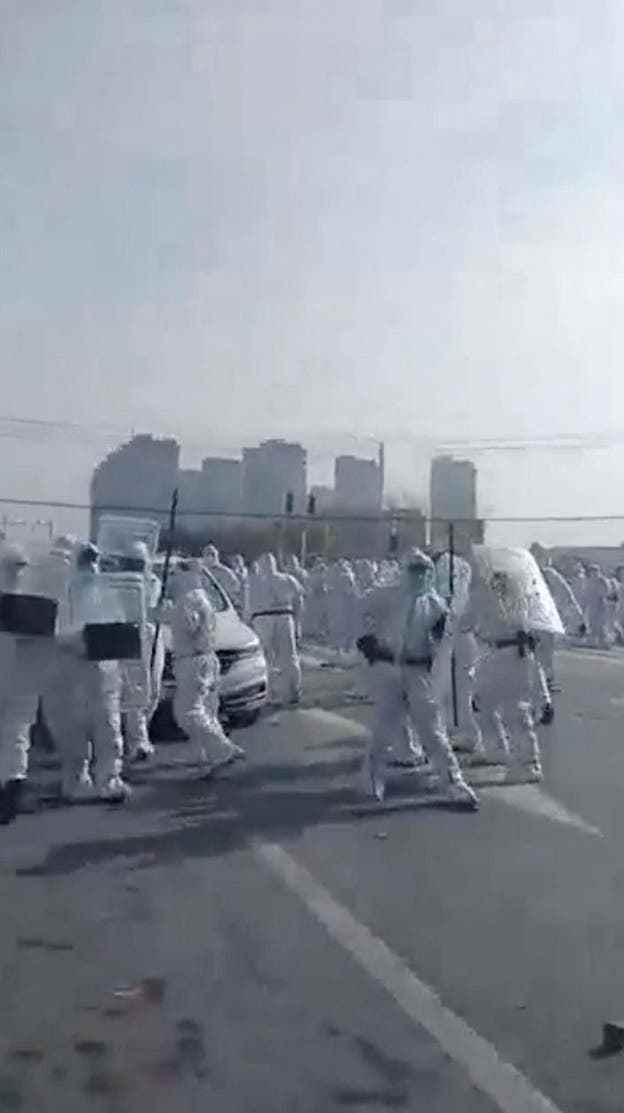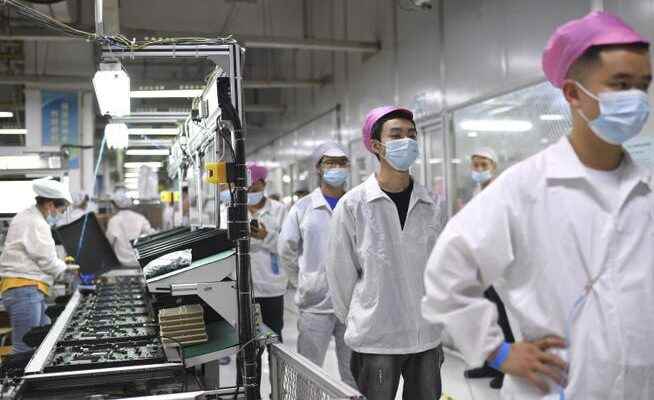The unrest and production losses in the iPhone city of Zhengzhou cost Apple millions of new iPhone 14 devices – that means losses in the Christmas business. The group should take this as an opportunity to produce less in China.
In the summer, Foxconn employees lined up for the Covid 19 test in an orderly manner. After being isolated, some without adequate food supplies, protests broke out.
The ongoing protests in China against Covid-19 restrictions and the resulting production bottlenecks are hitting the Apple group harder and harder. In the central Chinese city of Zhengzhou, known as “iPhone City”, protests have been affecting production of the new iPhone 14 for weeks now.
Up to 300,000 workers work and live at the Foxconn production site, who usually mainly produce iPhones at this time of year. But instead of delivering finished 14 models for the Christmas business on the assembly line in 24-hour shifts, they have been protesting for months.
Bonus payments for workers staying—and then for leaving
The demonstrations started in October. At that time, there were several Covid 19 infections in Zhengzhou. Many workers feared for their health because the Chinese government had been stoking great fears of the deadly virus for years. At the same time, the workers could not isolate themselves from the sick in their shared rooms, and there was also a lack of food. For safety reasons, however, they should not leave the factory premises. Thousands of factory workers fled in fear for their health.
Apple then released one on November 6th opinion, in which it warned of supply shortages for the new iPhone 14 and stressed that workers’ health was the most important thing. According to experts, Zhengzhou produces about 80 percent of the base model iPhone 14 and 85 percent of the more expensive model 14 Pro.
Foxconn tried to recruit new workers with bonus payments of up to $1,200. But apparently the Taiwanese company did not pay the promised bonuses, or they suddenly linked them to changed conditions. The strict Covid 19 lockdown measures also struck many.
The newly hired workers therefore took to the streets a few days ago, where the protests quickly turned violent. In a bid to end the chaos as quickly as possible, Foxconn is now bizarrely offering a $1,400 bonus to get the protesting workers off campus immediately.


On November 23, protests around the Foxconn factory in Zhengzhou escalated. These images are from cell phone videos.
At least 6 million less iPhone 14
The assembly lines in the factory are still not running at full speed, so there is a risk that too few iPhones will be available for the Christmas business. The media company Bloomberg cites local experts and estimates that six million fewer iPhones will be produced than planned as a result of the protests. Apple has reduced its production target for 14 models from 90 million to 87 million.
However, Foxconn apparently believes that it will be able to make up for part of the lost production in the coming year. Full-time employees who remain at the plant throughout January and December were now offered a bonus of $1,800.
Morgan Stanley analysts are more pessimistic about the situation. At the beginning of November, after the first round of protests, they had already assumed that there would be 6 million fewer iPhones. Well, they write, in the worst case scenario, no more iPhones will be shipped from the Zhengzhou factory this year.
Daniel Ives of financial firm Wedbush Securities estimated to CNNthat each week of protests and Covid shutdowns cost Apple about $1 billion in sales. “Now about 5 percent of total iPhone 14 sales are believed to be lost due to the brutal shutdowns.” The problems at Foxconn are “a punch in the stomach” for Apple this quarter.
Apple analyst Ming-Chi Kuo from TF International Securities even assumes that ten percent of the entire iPhone production capacity is now affected by the problems at Foxconn, as he wrote on Twitter.
(3/9)
2. More than 10% of global iPhone production capacity is currently affected as Foxconn’s Zhengzhou iPhone plants suddenly entered closed-loop production without warning.— 郭明錤 (Ming-Chi Kuo) (@mingchikuo) October 30, 2022
Apple itself has not commented on the production problems since the beginning of November. If you currently want to order an iPhone 14 Pro on Apple.com, you can pick it up directly from the store depending on where you live – or you have to wait until after Christmas for delivery.
The iPhone accounts for 50 percent of Apple’s sales
The incident also raises the fundamental question of whether Apple should continue to rely so heavily on China for iPhone production. The smartphone is the core product of the Apple Group and has accounted for around 50 percent of sales for years. Apple has so far been known for being able to control the global supply chain very well. Even during the pandemic, the Cupertino-based company has had few supply chain issues compared to its peers.
the “South China Morning Post” Summing up the chaos in Zhengzhou: “China’s manufacturing miracle, made possible thanks to masses of cheap but skilled labour, foreign capital and favorable local government incentives, is now being rapidly destroyed by three years of Covid restrictions.”
In fact, Apple is already testing other production countries in order to make itself less dependent on China: some of the iPads and a small part of the iPhone 14 are produced in India, and some of the Airpods and iPads are produced in Vietnam. The countries become all the more attractive the longer China sticks to its extremely strict zero-Covid policy. Analysts from JP Morgan estimated as early as September, before the latest protests, that by 2025 a quarter of the world’s iPhone production could take place in India. In addition, the proportion of all Apple devices that are produced outside of China is also likely to rise to 25 percent from the current 5 percent.
Research by the Reuters news agency also shows that Apple has reduced its dependence on China in recent years. While China’s share of Apple’s suppliers was 44 percent until 2019, it was only 36 percent in 2021.
The current development shows that everyone – even Apple – can be hit by the corona-related supply chain bottlenecks in China, analyst Anshel Sag from Moor Insights & Strategy told “Bloomberg”.
In fact, the Cupertino group is not alone in its attempts to relocate: Google will also have some of its latest pixel smartphones produced in Vietnam instead of in China. Likewise, Amazon and Microsoft are gradually moving away from the People’s Republic: Amazon now manufactures its Fire TV streaming devices in Chennai, India, and Microsoft its Xbox game console in Ho Chi Minh City, Vietnam.
